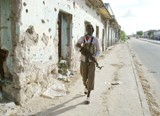A Somali official yesterday appealed for international help to fight piracy, saying the war-torn nation needed an effective coastguard, equipment and training to combat the high-seas menace.
Nur Mohamed Mohamoud, deputy director of Somalia’s national security agency, told an international conference that it was keen to tackle the pirate threat that is disrupting one of the world’s busiest maritime trade routes.
“We know where they hide. We are prepared to fight. We ask the international community to help us to fight piracy,” he told the conference of maritime experts, diplomats and security officials meeting in the Malaysian capital.

PHOTO: REUTERS
“We need an effective coastguard to protect our fishermen from illegal fishing, to prevent dumping of toxic materials in our waters and fight shipping piracy,” he said. “We ask the international community ... to supply us with equipment and training.”
A country of 7 million people, Somalia has had no effective central authority since former Somali president Mohamed Siad Barre was ousted in 1991, setting off a bloody cycle of clashes between rival factions.
Pirate attacks off Somalia and in the Gulf of Aden jumped tenfold in the first three months of this year compared with last year, rising from six to 61, data from the International Maritime Bureau showed.
Mohamoud said that Somalia, where the current transitional government is facing a serious challenge from Islamist insurgents, would not be able to eradicate piracy as long as it remained poor and ungoverned.
“Somalia is a war-torn country. We want Somalia waters to be safe. We do not want pirates in our waters,” he told the meeting.
“An end to piracy can only be brought if the rule of law can be enforced and causes of piracy tackled. Piracy will continue to be a problem as long as the violence continues in Somalia,” he said.
Experts at the two-day conference in the Malaysian capital will tackle divisive issues including who should pay for anti-piracy operations, and whether crews should be armed or mercenaries hired to guard ships.
There is also a debate over what to do with pirates arrested by the navies patrolling the troubled region and whether short-term security measures or longer-term development initiatives are the best way to curb high-seas crime.
Speakers include UN envoy for Somalia Ahmedou Ould-Abdallah, US naval and coastguard officials and Tim Wilkins from owners’ association INTERTANKO.
The delegates will adopt a statement today outlining possible solutions to eliminate the pirate menace.
Somali piracy started two decades ago with more noble goals of deterring illegal fishing and protecting the nation’s resources and sovereignty at a time when the state was collapsing.
Today’s pirates have morphed into a sophisticated criminal ring with international ramifications. Anti-piracy naval operations operating under US, EU and NATO commands now patrol the region.
Some 20 foreign warships cruise Somalia’s coast on any given day in a partly successful effort to protect the trade route, but experts at the meeting will discuss a more comprehensive solution.

James Watson — the Nobel laureate co-credited with the pivotal discovery of DNA’s double-helix structure, but whose career was later tainted by his repeated racist remarks — has died, his former lab said on Friday. He was 97. The eminent biologist died on Thursday in hospice care on Long Island in New York, announced the Cold Spring Harbor Laboratory, where he was based for much of his career. Watson became among the 20th century’s most storied scientists for his 1953 breakthrough discovery of the double helix with researcher partner Francis Crick. Along with Crick and Maurice Wilkins, he shared the

OUTRAGE: The former strongman was accused of corruption and responsibility for the killings of hundreds of thousands of political opponents during his time in office Indonesia yesterday awarded the title of national hero to late president Suharto, provoking outrage from rights groups who said the move was an attempt to whitewash decades of human rights abuses and corruption that took place during his 32 years in power. Suharto was a US ally during the Cold War who presided over decades of authoritarian rule, during which up to 1 million political opponents were killed, until he was toppled by protests in 1998. He was one of 10 people recognized by Indonesian President Prabowo Subianto in a televised ceremony held at the presidential palace in Jakarta to mark National

US President Donald Trump handed Hungarian Prime Minister Viktor Orban a one-year exemption from sanctions for buying Russian oil and gas after the close right-wing allies held a chummy White House meeting on Friday. Trump slapped sanctions on Moscow’s two largest oil companies last month after losing patience with Russian President Vladimir Putin over his refusal to end the nearly four-year-old invasion of Ukraine. However, while Trump has pushed other European countries to stop buying oil that he says funds Moscow’s war machine, Orban used his first trip to the White House since Trump’s return to power to push for

LANDMARK: After first meeting Trump in Riyadh in May, al-Sharaa’s visit to the White House today would be the first by a Syrian leader since the country’s independence Syrian President Ahmed al-Sharaa arrived in the US on Saturday for a landmark official visit, his country’s state news agency SANA reported, a day after Washington removed him from a terrorism blacklist. Sharaa, whose rebel forces ousted long-time former Syrian president Bashar al-Assad late last year, is due to meet US President Donald Trump at the White House today. It is the first such visit by a Syrian president since the country’s independence in 1946, according to analysts. The interim leader met Trump for the first time in Riyadh during the US president’s regional tour in May. US envoy to Syria Tom Barrack earlier